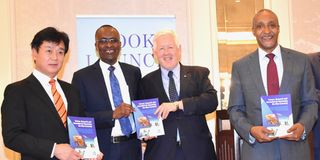Blue Economy: Challenge of balancing exploitation with marine life protection

Delegates during the Research and Innovation for Harnessing the Blue Economy book launch at the Intercontinental Hotel in New York.
Economists and researchers are warning that Kenya and East Africa could lose economic benefits from ocean and other water bodies if no measures will be taken on those destroying marine life.
As part of their contribution to prevent further destruction of marine life, the experts, drawn from various sectors, have unveiled a book titled Science, Research and Innovation for Harnessing the Blue Economy after Kenya hosted the “Sustainable Blue Economy Conference” in Nairobi in 2018, four years ago.
The team of researchers defines the Blue Economy as the productive pillar of the oceans, seas, lakes and rivers including fisheries, aquaculture, tourism, transport, shipbuilding, energy, bio-prospecting, and underwater mining as well as all-related activities.
The researchers, comprising the Science and Research Symposium, a secretariat of the “Sustainable Blue Economy Conference”, are drawn from the public and private sectors. Through the publication, they have shown the immense wealth hidden in the Blue Economy, and the looming disaster facing Kenya, Africa and the rest of the world should it fail to protect the natural resources.
It elaborates how the Blue Economy ties with world economy socio-economic stability, and how it interlocks with ongoing climate change and the need to control pollution.
The experts speak out as preparations are ongoing for the 2022 “United Nations Conference to Support the Implementation of Sustainable Development Goal 14” to be co-hosted by Kenya and Portugal in Lisbon.
The preparation of the 156-page publication; a collaborative initiative between the Kenya Government and the Stockholm Environment Institute (SEI), further asks governments to develop feasible policies that are sustainable in line with each region’s socio-economic ability.
“Poor management and failure to protect Blue Economy resources will spell doom for many families deriving a sustainable livelihood from it. If nothing will be done to prevent ongoing pollution within forestry and water sources that are generally feeders to the oceans, seas, lakes, rivers, riparian and related marine life, we can only expect reduced production, a decelerated country-to-county economic growth, jobs’ loss and poverty increase,” says Dr Francis Owino, the Principal Secretary in charge of driving the Blue Economy agenda in Kenya.
Dead marine zones in the world
For instance, oceans are the means of transport for 80 percent of global trade volume, and over 70 percent in total value, according to the 2012 United Nations Conference on Trade and Development (UNCTAD) report.
Two-thirds of world energy supplies are carried by sea and there is, still, vast untapped potential for renewable blue energy production from wind, waves, tidal, thermal and biomass sources.
As this happens, experts are calling for increased funding on research related to marine life. Currently, there are 405 documented dead marine zones in the world, covering an area of over 240,000 square kilometres.
But ocean science research only accounts for between 0.04 percent and 4 percent of total development expenditures worldwide, according to the 2017 Global Ocean Science Report released by the Intergovernmental Oceanographic Commission of UNESCO (IOC-UNESCO).
Lack of scientific capacity is one of the challenges facing the Blue Economy in developing countries.
“As researchers, we are working towards complementing climate adaptation programmes in coasts and islands. We have been constantly informing governments on appropriate ways of integrating mitigation measures to control roaming risks to marine pollution, coastal resilience and adaptation, governance of the blue economy, and commodity-driven land-use change and biodiversity loss,” says Dr Philip Osano, director, SEI Africa Centre, and one of the book’s editorial committee members.
Dr Owino says while major disparities exist in capacities around the world to undertake the research necessary for proper Blue Economy management and related human activities, “our collective success as people of one planet, lies in the ability to build partnerships and strengthen synergies.”
Unesco will continue promoting intergovernmental cooperation aimed at generating knowledge about the natural resources of the ocean and coastlines, says Dr Vladimir Ryabinin, Executive Secretary of the Intergovernmental Oceanographic Commission of Unesco (Unesco-IOC).
Kenya and Africa look forward to a more robust engagement of African scientists, and knowledge and technology communities in the quest for a sustainable Blue economy, says Amb Macharia Kamau, Principal Secretary, Ministry of Foreign Affairs, who has written the preface.




